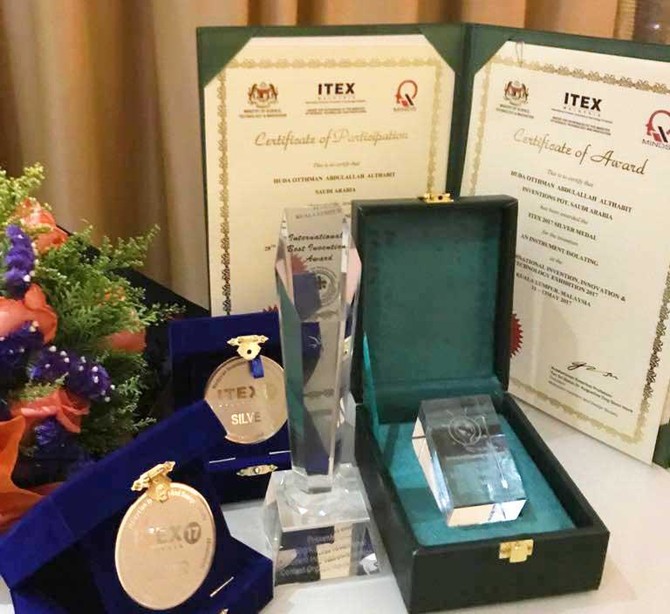RIYADH: Huda Othman Althabit is a Saudi pediatric dentist who graduated in 2013 from Riyadh Elm University Dentistry Hospital in Riyadh. She pursued her masters from the same university and is currently studying for the Saudi Board Certification in pediatric dentistry, which she aims to receive by the end of this year.
During her internships and medical practices, Althabit noticed that when she worked in the operating room, she faced numerous obstacles.
“I faced many challenges in protecting the tongue and cheeks during dental treatment, especially in the advanced cases while taking patients under general anesthesia for surgery. Many side effects can possibly happen in the operating room or even in the dental chair. We use lots of sharp instruments and those instruments may injure tissues accidentally, or the patients might swallow some of the dangerous instruments. These possibilities can happen. This was my ultimate motive. I want to help both the dentists and patients have a better experience during operations and treatments,” Althabit said.
Althabit spent time thinking about and working on how to protect the oral cavity of dental patients. “After being stuck in this process, I invented an instrument that can help dentists and patients to equally feel more comfortable. I can work safely in both the upper and lower teeth with complete protection of the tongue by covering it and even the cheek. It gave me an isolation environment. So when I work on the upper teeth, everything else will be isolated and covered, that will lead to no injuries at all, inshallah. It saves time, effort, and reduces danger. My quality of treatment has been also enhanced.”
Althabit’s invention is basically a dental isolator for protecting the tongue and cheek during dental treatment. This invention aims to provide a simple and innovative dental isolator characterized by lightness and easiness to use to achieve two main goals.
The first goal is for the patient, for comforting them and protecting the tongue, checks and other oral tissues from sharp dental instruments, and also avoiding accidental swallowing of dental materials. The second goal is for the dentist, by providing a dry and hygienic dental environment, easily and comfortably treating the upper and lower teeth with less risks and time. It can be also used during dental treatment without the need to replace as it fits both sides of the mouth.
“The instrument consists of a flexible isolating pad with two sides: (A) for the tongue, (B) for the checks (both sides). Each one of them has a saliva-absorbing layer. The two are connected by flexible folding tape. It is also characterized by borders that do not cause any bruises or injuries to the soft tissue,” she said.
Her journey did not stop when she found the idea, it continued with how to get a patent. “I received the patent from the Saudi Patent Office. Everything was online and that helped me a lot because it saves time,” she said.
After the patent, Althabit experienced challenges with how to produce the isolator; she faced many challenges when it came to the factories.
“I consulted lots of people; they made me feel that everything was completely complex and nothing would happen. One of them told me that “you are a researcher, never think of yourself as an inventor because you will never be.” It put me down but later on I saw it as an obstacle that should be overcome. Then I contacted Badir Program for Technology Incubators; they set consultancy meetings and advised me with lots of things including who to consult, where to go and what to do next. I designed the prototype for the invention,” she said.
However, many of the factories in Saudi Arabia refused to manufacture the invention because they did not believe it would succeed.
“They did not want to risk it because they were not sure of the sales. I wanted to take my invention into a really visible level. In the beginning I used very simple materials: Plastic, cotton, and stickers to make my invention, but this was to explain how the invention should work and how it should look like.”
After the difficulties Althabit faced with factories and manufacturing companies, she decided to establish her own small “modern innovation company” five months ago. “My company is specialized in manufacturing inventions and importing medical supplies. I do have a few more inventions, but I am still working on them to get patents. I am planning to invent them all in my company.”
She has had many meetings with dentists and hospitals to experience the invention and later to make it part of the dental operating rooms in their hospitals.
Althabit has also presented her invention at ITEX2017 in Malaysia and won the silver medal in the medical field and a prize from Hong Kong as the best invention (at ITEX many countries participated and each country gives a “best prize” for what they believe it is the best invention).
“I presented my invention also to the American patency and thanks to Allah there was a publication to my invention there and I will continue, inshallah with them,” she said.
“I am doing everything I possibly can to strike the right balance between my studies, my invention and my company. I personally and proudly noticed the developments happening in my country since I registered for Badir online. I felt that my country is welcoming inventions, technology and everything that can lead to developments in all aspects. So never, ever stop,” she said.





































